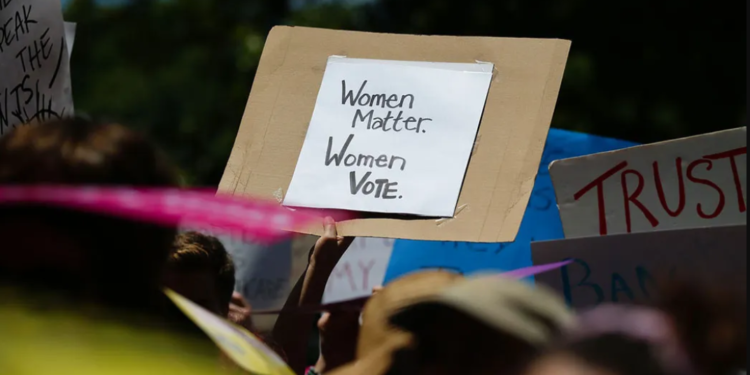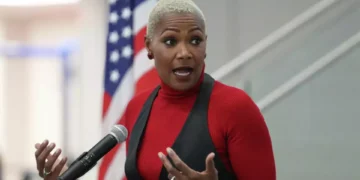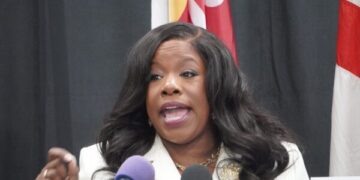A woman holds a sign during a protest in Atlanta, May 2019. (Getty/Elijah Nouvelage)
Jul 3, 2024 Story by: Editor
For decades, Black women have been a steadfast voting bloc for the Democratic Party, with recent elections showing strong support. Despite this, findings from the KFF Survey of Women Voters indicate a significant sentiment among Black women that neither political party adequately represents their interests. This dissatisfaction stems partly from economic disparities exacerbated during the pandemic, where Black women faced higher unemployment rates compared to other groups.
Black Women’s Shift in Political Loyalties
The KFF survey reveals a notable shift in Black women voters’ intentions leading up to the 2024 election. While a majority still align with President Biden, a quarter of those who supported him in 2020 now plan to either vote for Trump (8%) or abstain from voting (14%). This shift underscores evolving political considerations among Black women.
| “Among Black women voters, one-quarter of those who voted for Joe Biden in 2020 now say they either plan to vote for Trump in 2024 (8%) or say they will not vote (14%).” – KFF Survey of Women Voters |
Inflation and Economic Concerns
Inflation emerges as the foremost concern for Black women voters, significantly influencing their voting decisions. Rising household expenses have heightened anxieties about affording basic necessities, with a majority expressing deep worries about food, utilities, healthcare, and housing costs.
| “About half of Black women voters say that inflation, including the rising cost of household expenses (53%) is the most important issue determining their vote in the 2024 presidential race.” – KFF Survey of Women Voters |
Evaluation of Presidential Leadership
When evaluating President Biden’s tenure, opinions vary among Democratic Black women voters. While there is approval on issues like immigration and healthcare affordability, a majority disapprove of his handling of inflation, reflecting nuanced perspectives within the community.
| “A majority (55%) of Democratic Black women voters disapprove of Biden’s handling of inflation, including one in four (25%) who say they disapprove ‘strongly.'” – KFF Survey of Women Voters |
Prioritizing Personal Characteristics in Voting
Personal qualities of candidates weigh heavily in Black women voters’ decisions, surpassing policy stances. Leadership ability, character, values, and experience are cited as pivotal factors, indicating a preference for candidates who resonate on a personal level.
| “Two-thirds (64%) of Black women voters nationally say a candidate’s personal characteristics, including their leadership ability, character, values, and experience will make the biggest difference to their vote.” – KFF Survey of Women Voters |
Generational Differences in Voting Intentions
There is a notable age disparity in voter certainty among Black women, with older demographics showing higher certainty to vote compared to younger counterparts. Dissatisfaction with unmet promises from political candidates contributes to lower turnout intentions among younger Black women.
| “About three in four Black women ages 50 and older (77%) say they are ‘absolutely certain’ to vote. Fewer Black women under age 50 say they are certain to vote (49%).” – KFF Survey of Women Voters |
Conclusion
As the 2024 election approaches, understanding these dynamics among Black women voters is crucial. Their shifting political affiliations, economic concerns, and emphasis on candidate qualities will shape electoral outcomes and policy priorities in the coming years. Source: KFF

















